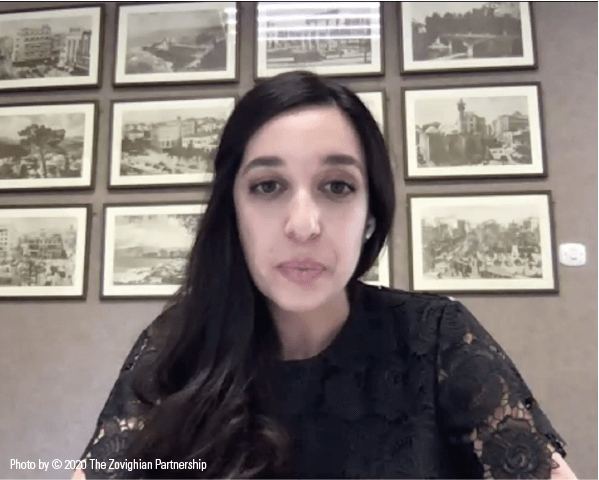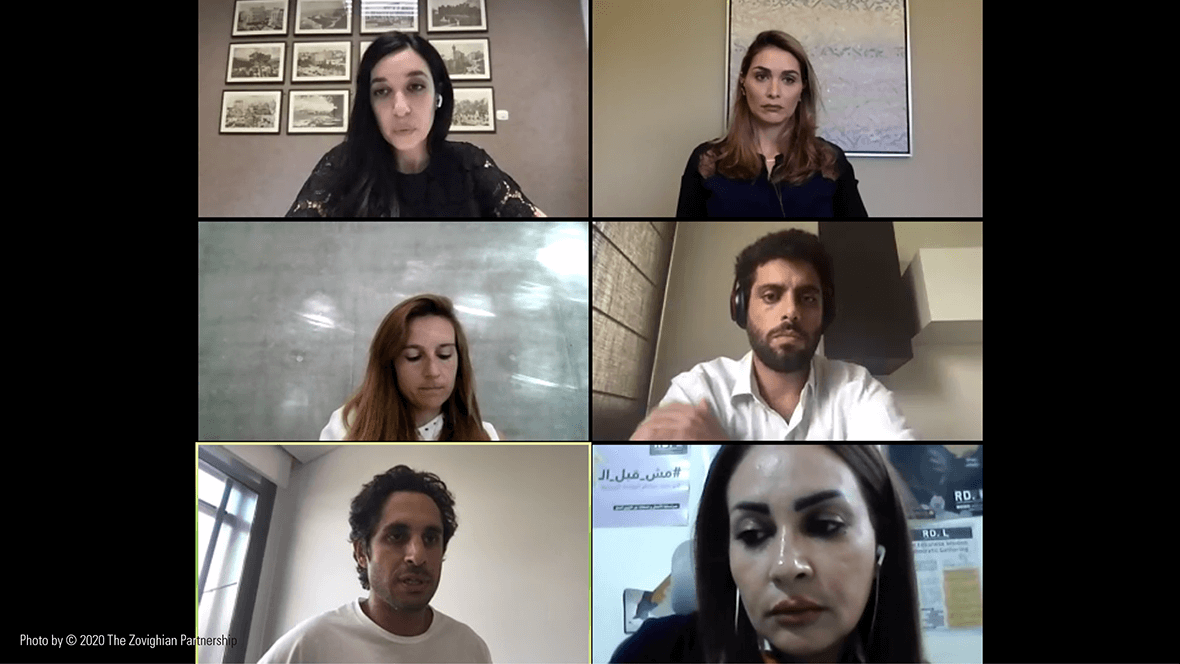FIRST WORKING PAPER ON URGENT FUNDING NEEDS & RISKS RELEASED & CO-SIGNED BY LOCAL ECOSYSTEM
FOR IMMEDIATE RELEASE
Press release
The Zovighian Partnership team hosted a public briefing to feature the working paper on August 27, 2020 over Zoom.
BEIRUT, LEBANON, 27 AUGUST − Sixteen organizations and private initiatives representing the Lebanese local ecosystem responding to the Beirut Explosion on the ground have come together with The Zovighian Partnership to co-define and co-sign the first working paper on emergency funding needs. The working paper follows exploratory focus group discussions and strategy working sessions with representatives of the local ecosystem.
The working paper is part of a growing momentum to invest in meaningful data to support emergency response efforts following the Beirut Explosion. It is the first paper inaugurating a series of working papers that brings together research respondents for a qualitative data collection and collaborative analysis.
Specifically, this paper series and research aim at delivering on five objectives: (1) Bringing voice to the local ecosystem on the ground; (2) Understanding under-funded emergency needs; (3) Investigating how humanitarian capital flows are at risk of causing harm if we are not mindful and careful; (4) Framing an initial framework and blueprint for authentic, time-critical, and impactful social investment capital flows; and (5) Presenting a research pilot to inform the commissioning of a full-fledged ecosystem research mission.
The authors and seventeen co-signatories write in its pages: “Defining and activating an ethical and long-term national social investment strategy is primordial to enabling strategic, and vision-directed humanitarian capital and investments flows into Beirut and Lebanon.”
At a time when emergency response can incidentally result in very reactive and siloed efforts following a catastrophe of this magnitude, the need for intentional and targeted strategic thinking, analysis, and activation is a pre-requisite for an effective long-term recovery. This first working paper presents to donor governments, institutional and diaspora investors, the media and local ecosystem, as well as the private sector and broader public a framework to begin to investigate, organize, and commit to salvaging and re-building Beirut.
The paper lists ten lenses that are interconnected and dynamic to support the management of future humanitarian and investments capital flows into Lebanon: (1) Financial sustainability; (2) Assets-based development; (3) Systems-thinking; (4) Evidence-centricity; (5) High participatory self-determination; (6) Inclusivity; (7) Community dignity & preservation; (8) Do not harm; (9) Value factor of time; and (10) Opportunity cost.
The working paper was launched in a public briefing and press conference over Zoom on Thursday, August 27, 2020 from 16:00-18:00 with a Facebook Live on The Zovighian Partnership (ZP) Facebook page. Hosted by Lynn Zovighian, Managing Director of The Zovighian Partnership, Zovighian commenced the event with a symbolic request to rise for the national anthem.
We had the pleasure of welcoming a panel of five active and strategic speakers representing the local ecosystem on the ground.
The featured national anthem brought together the voices of the hardworking volunteers of Basecamp in Mar Mikhael with international Lebanese opera singer, Maria Mattar, virtuoso Lebanese pianist, Dima Mneimneh. The montage featured the drone footage of the devasted areas of Beirut by Rami Rizk, with production and curation by Joe Chedrawi. The chosen lyrics of the national anthem represented a throwback to October 31, 2019 when Lebanese pan-regional newspaper, Annahar, re-branded itself as Naharnouki and proposed an amended national anthem that introduces “al-neesah” (women) when mentioning the men and people of Lebanon.
The public briefing followed with a thirty-minute technical presentation introducing the proposed framework to draft the national social investment strategy of Lebanon. During her presentation, Zovighian remarked, “We are all here to rebuild communities. Let us make sure that we preserve those communities and let us also make space for these communities to respond and reinvent themselves in their own ways.” She added, “However, whatever we do must always be done with utmost dignity. Dignity needs to be designed for. Just because we are being humanitarian does not mean we are necessarily doing so in a dignified manner and practice. The two do not necessarily come hand in hand.”
A panel featuring the local ecosystem followed, with Sarine Karajerjian, Grants & Special Projects Manager of the Issam Fares Institute (IFI) at the American University of Beirut (AUB) as moderator. The panelists were Nadine Hamadeh, Executive Director of the Lebanese Democratic Women’s Gathering (RDFL); Yasmin Kayali Sabra, the Co-founder and Chief Communications Officer of Basmeh & Zeitouneh; Peter Mouracade, Founder of Mutwatin Lebneneh and Co-Founder of Basecamp; and Samer Makarem, Organizer and Strategist of Minteshreen and member of Basecamp.
The debate that ensued began with getting the basic emergency needs to affected communities without infringement of rights or causing harm. Hamadeh called for a re-definition of what is a basic need in Beirut, saying, “Maybe some people do not consider psycho-social support to be a basic need, but I think this is essential because you have no clue, when we went to the streets and we were responding to people’s basic needs, how much the people need it.”
Sabra remarked on the importance of addressing basics while being inclusive at all cost. She said, “I reiterate, leave no one behind in your assessments. Make sure you assess based on needs.”
Speaking on the importance of ensuring all segments of society are provided for in the emergency response, Sabra said, “We have to think about everybody; the refugees, the migrant workers, the elderly who are not mobile and do not know how to reach out to NGOs. And make sure you look not only for food and shelter security. Look at psycho-social support, livelihoods support. We need to be agents of a full recovery”
Hamadeh also spoke to the importance of being mindful of the unique needs and challenges of women who have been affected by the Beirut Explosion, saying, “These damaged houses, a collapsed infrastructure, where there is no electricity, makes women more exposed to harassment. And also, the women who are left with no shelter who have to go live in another house, they might be also exposed to harassment.”
When speaking to the growing concerns of financial sustainability, Makarem explained, “Now if we want to talk about the challenges and the biggest challenge that we are facing, I would probably say human stamina and volunteer energy. Obviously, right after the crisis, people are there, they are willing to spend 12 hours a day, 13 hours a day. Three weeks on from the crisis, we have to think about volunteer morale, management morale. It becomes very difficult to stay as concentrated or to stay as focused on dedicating yourself. Finding a way to manage burnout and manage our volunteer energy is by far the biggest challenge, as we move forward.”
Mouracade insisted on the importance of investing in human capital, saying, “The level of talent that was on the ground over the past three weeks was incredible, incredible. We need to really harness this talent that we have before they feel desperate and leave this country. We need to invest in our talent, and we need to stay nimble and agile.”
Karajerjian remarked on the authentic expertise of the panel after the public briefing, saying, “All four panelists brought a synopsis of the stories on the ground and helped raise awareness on what needs to be done in the short term and how to approach the repercussions of the crisis on the longer term.” She also highlighted the energy of the convening, saying, “The actions on the ground are bringing hope. All panelists emphasized that going back to before August 4 is not a viable option.”
The public briefing ended with a press conference, welcoming the local and international media.
The working paper co-signatories and represented organizations are: Achrafieh 2020; American University of Beirut (AUB) The Neighborhood Initiative; Basmeh & Zeitooneh; Beirut Pride, Bloom (formerly Alt City); Dawrati; Dent de Lait; Emerge Beirut; The Lebanese Democratic Women’s Gathering (RDFL); Mayrig; Mineteshreen, a member of Basecamp; Mousawat; Muwatin Lebnene, a member of Basecamp; The Nawaya Network; Rotaract Lebanon; Sawa for Development & Aid; private citizen, Sarine Karajerjian; and The Zovighian Partnership.
It is available on The Zovighian Partnership website at
https://www.zovighianpartnership.com/public-office/lebanon-crises/beirut-explosion and all footage will be made available in edited format on YouTube.
For more information, please contact Elsy Osta at +961 1 572 001 ext. 104 or elsy.osta@traccs.net
The Zovighian Partnership is a family-owned social investment platform, established by father and daughter in 2013. Deeply invested in R&D, we are committed to delivering ethical, inclusive, and innovative design, research, and prototypes.
The Zovighian Partnership
Public Office
is committed to delivering significant resources to bringing grounded methodology, sound governance, and rigorous strategic thinking to communities and cities in crisis. We hold ourselves accountable to giving voice to the diversity of views that are central to long-term and sustainable peace and socio-economic enablement.



